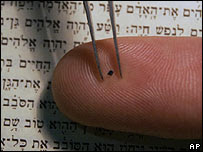
Researchers in Israel say they have succeeded in putting a version of the Bible on a chip smaller than a pinhead. Its 300,000 words in Hebrew were inscribed on a silicon surface at the Haifa Institute of Technology. Scientists say the aim of the project is to increase young people’s interest in nanoscience and nanotechnology. The record for the smallest copy is held by a Bible measuring 2.8×3.4×1cm (1.1×1.3×0.4in), weighing 11.75g (0.4 ounces) and containing 1,514 pages. The 0.5sq-mm (0.01sq-in) nano-Bible was written on a silicon surface covered with a thin layer of gold (20nanometres thick - 0.0002mm).
It was written using a device called Focused Ion Beam (Fib). “When we send the particle beam toward a point on the surface, the gold atoms bounce off of this point, thus exposing the silicon layer underneath,” Ohad Zohar, one of the project’s managers at Technion, said. “By sending a particle beam towards various points on the substrate, we can etch any pattern of points, especially one that represents text.” The next step for Technion researchers is photographing the Bible and displaying it on a giant wall within the Faculty of Physics.
Source: BBC




